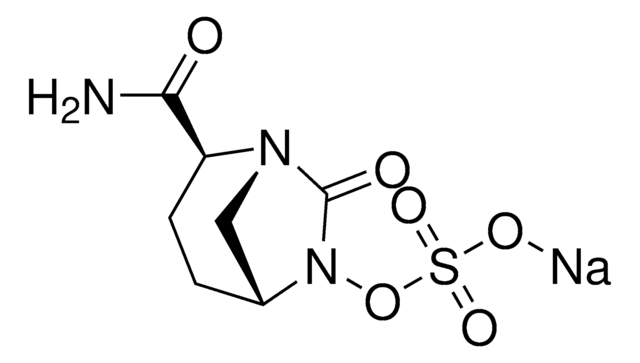PZ0042
Sulopenem
≥97% (HPLC)
Synonym(s):
(5R,6S)-6-[(1R)-1-Hydroxyethyl]-7-oxo-3-[[(1R,3S)-tetrahydro-1-oxido-3-thienyl]thio]-4-thia-1-azabicyclo[3.2.0]hept-2-ene-2-carboxylic acid, CP-70429
About This Item
Recommended Products
Assay
≥97% (HPLC)
form
powder
color
white to beige
solubility
DMSO: 2 mg/mL, clear
shipped in
dry ice
storage temp.
−20°C
SMILES string
O=C(O)C1=C(S[C@@H]2C[S@+]([O-])CC2)S[C@@]3([H])N1C([C@]3([H])[C@H](O)C)=O
InChI
1S/C12H15NO5S3/c1-5(14)7-9(15)13-8(11(16)17)12(20-10(7)13)19-6-2-3-21(18)4-6/h5-7,10,14H,2-4H2,1H3,(H,16,17)/t5-,6?,7+,10-,21?/m1/s1
InChI key
FLSUCZWOEMTFAQ-JNCILSLHSA-N
1 of 4
This Item | PZ038 | SML2846 | SML2859 |
|---|---|---|---|
| assay ≥98% (HPLC) | assay ≥98% (HPLC) | assay ≥98% (HPLC) | assay ≥98% (HPLC) |
| storage temp. −20°C | storage temp. room temp | storage temp. −20°C | storage temp. −20°C |
| solubility DMSO: 2 mg/mL, clear | solubility DMSO: 2 mg/mL, clear | solubility DMSO: 2 mg/mL, clear | solubility DMSO: 2 mg/mL, clear |
| color white to beige | color white to beige | color white to beige | color white to beige |
| shipped in dry ice | shipped in - | shipped in - | shipped in - |
Biochem/physiol Actions
Storage Class Code
11 - Combustible Solids
WGK
WGK 3
Certificates of Analysis (COA)
Search for Certificates of Analysis (COA) by entering the products Lot/Batch Number. Lot and Batch Numbers can be found on a product’s label following the words ‘Lot’ or ‘Batch’.
Need A Sample COA?
This is a sample Certificate of Analysis (COA) and may not represent a recently manufactured lot of this specific product.
Already Own This Product?
Find documentation for the products that you have recently purchased in the Document Library.
Our team of scientists has experience in all areas of research including Life Science, Material Science, Chemical Synthesis, Chromatography, Analytical and many others.
Contact Technical Service









